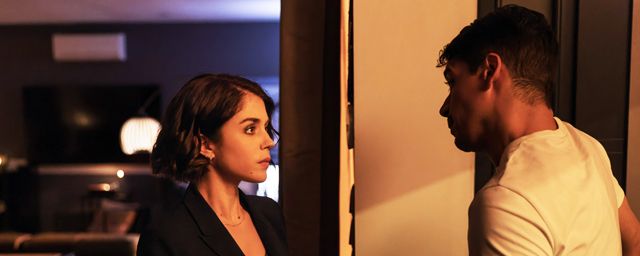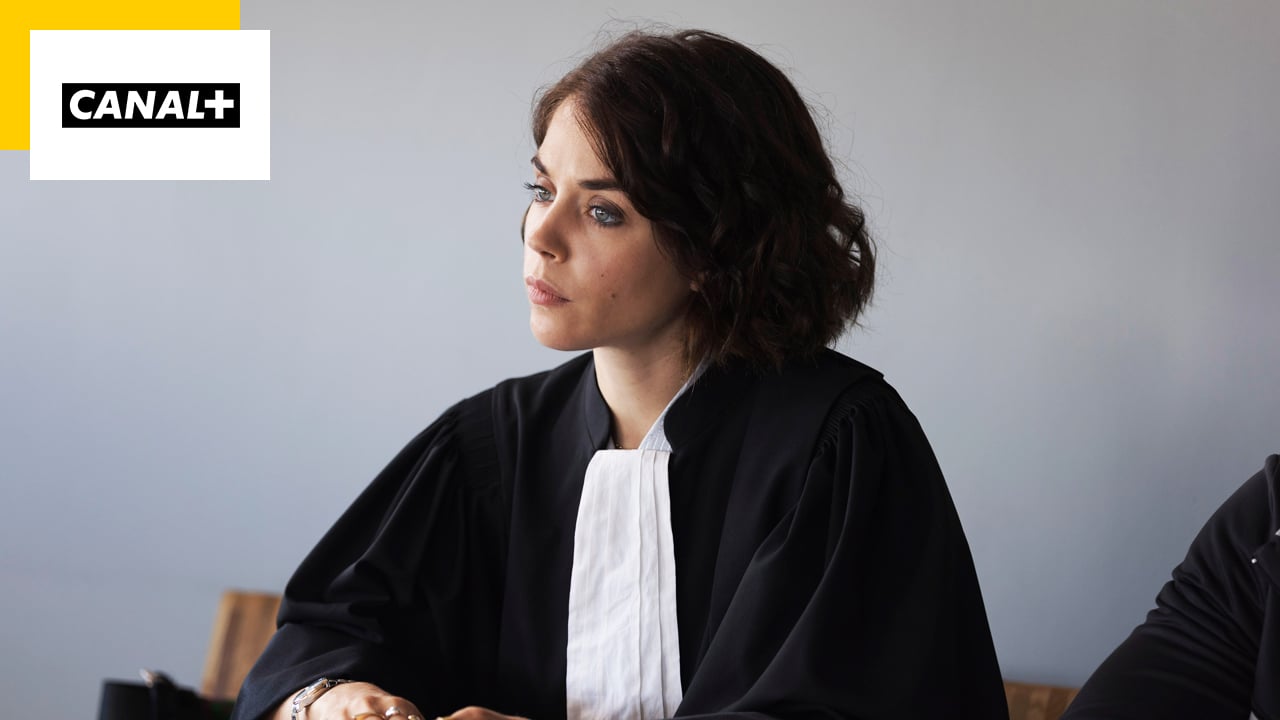Heroine for the first time in a series, Alice Isaaz plays Roxane, a young lawyer who makes a major turning point in her professional and private life, in “66-5”, the new CANAL+ series. She spoke to us very strongly about this role.
In the credits last year for Notre-Dame, la Part du feu on Netflix, actress Alice Isaaz landed, at 32, her first leading role in a series thanks to the legal drama 66-5, broadcast every Monday evening on Canal+ since on September 18.
In this Original Creation by Anne Landois (Engrenages, La Promesse), she plays the role of Roxane Bauer, a young business lawyer in a prestigious Parisian firm who sees her life turned upside down when her husband, a partner in the firm, is accused of rape . Brought back against her will to the city of her childhood, she will try to rebuild herself as a criminal lawyer at the Bobigny court. And will have to face the ghosts of his past.
Alice Isaaz spoke to us about this complex character, the very strong themes of the story, its feminist aspect, and her work with the creator and the two directors of 66-5, which stands out more than ever as a series of women.
What did you like about 66-5?
Alice Isaac : Many things. Already, to be very sincere, the fact that I was offered the main role in a Canal+ series. I find that there is really a guarantee of quality in Canal+ Original Creation. I really experienced this series as a gift. Then, I liked this character of Roxane, who is a very beautiful portrait of a young woman. He’s a strong character who goes through a lot. It was a real challenge as an actress to interpret her because she is at an important turning point in her life. She is going through enormous upheavals. So, for me, it was super exciting to tackle.
Then, obviously, there is also the fact that this series was written by Anne Landois, whose talents as a screenwriter we know. That it is directed by two directors, Danielle Arbid and Karen Ben Rafael, who come from auteur cinema and who brought their touch to 66-5.
And the last thing is the legal aspect, which Anne and the screenwriters really approached through the prism of youth. Initially, when I read the script, I said to myself “Am I going to be credible in the role of a lawyer?”. I didn’t feel very legitimate, but then I attended immediate appearances at the Bobigny Court to prepare for the role and I was really struck by the youth of the magistrates and lawyers.
I think it’s also quite specific to this court, but I said to myself “It’s a reality”. I think it’s important to show it on screen because, until now, from what I had seen of series or films set in the legal environment, I found that we had an image a little older in this environment. So, if young people can become interested in this path thanks to the series, that’s great.
Was the legal jargon not too complicated to learn and handle?
It’s funny, I’m often told “But it’s not too hard to learn all these texts?”. Luckily, that’s not where the difficulty of the acting profession lies, for me. It’s not so much about learning the text, although it’s true that, in 66-5, there are a lot of technical terms.
As it was a universe that was completely foreign to me before, I really had to learn everything and above all understand everything. And for that, fortunately, I was very well supported by Anne Landois, the creator, who masters the subject very well, and by Clarisse Serre, a criminal lawyer who was a consultant on the project and who accompanied Anne throughout the entire process. creation of the series. I always referred to them whenever I had the slightest question.
Denis Manin – Sortilèges Productions / Canal+
How would you describe Roxane?
I think she represents young women of my generation very well. She is a young woman who is strong, who also has a great deal of sensitivity, who has great convictions, who gives herself the means to obtain what she wants, who is careerist, ambitious. She doesn’t let herself be walked on. I think she can be a great role model for young women and men who watch the series.
There is a real duality about her. She was born in Bobigny, in the town of l’Abreuvoir. She grew up there, she experienced a tragedy there when she was young. And despite everything, she emancipated herself from all that. She made it a strength. She evolved in a more bourgeois Parisian environment. She joined one of the largest business firms in Paris.
Behind, even when her life collapses, she bounces back and she finds herself being a criminal lawyer at the Bobigny Court, even though she was not necessarily destined for that. And even that’s not what she wanted at the start. I think it’s a very good example of saying “It doesn’t matter where you come from, it doesn’t matter if you weren’t born with all the right cards in your hand, you can get there”.
The character of Bilal, played by Raphaël Acloque, which we discover little by little over the course of the episodes, sums up quite well what Roxane is experiencing, this loss of direction, this duality. Because she ran away from him too, and ultimately everything brings her back to him. How do you analyze this link that unites them?
I have always been a little fascinated by these romantic relationships which have a certain taste of unfinished business, in youth, in adolescence or even in adulthood. And which sometimes resurface like that years later. What makes this spark reborn? That has always appealed to me.
While she would have reason to be very angry with Bilal…
It’s true, but I find it super fair. That’s what I like about the character of Roxane, she’s not just a strong girl who emancipates herself. It also has its flaws, I find that very realistic. In my circle, I have already said to friends “You can’t keep being with this guy, you have to run.”, and we realize that we do not always understand what motivates the person to return there. I think it’s good to talk about it. I don’t feel like I’ve seen this kind of story in many films or series.

Denis Manin – Sortilèges Productions / Canal+
For you, is 66-5 a feminist series?
We haven’t put words to it, not so clearly at least. But, yes, for me it’s a feminist series because it’s the story of a woman who evolves in very masculine environments, whether in Paris or in Bobigny, in these two lives that she can have, in these two slightly different worlds, these two different social classes.
In her Parisian office, there are these men who mistreat her, but she does not let it happen. So yes, it’s a feminist series in that sense. She knows how to impose herself, she knows how to assert herself and, above all, she wins in the end, I think. She’s the one who’s doing the best, without spoiling too much (laughs). And then, in the production too, it’s a series which was written by a woman, which was produced by two women, that’s important.
Did you feel this feminine touch on set?
I don’t know if I would differentiate that much between two directors, whoever they are, by their genre. I identify them above all in relation to the artist they are, in relation to their personality, more than by the fact that they are a man or a woman. Afterwards, on 66-5, I would say that it changed the way I arrived on the board at the beginning. I think that there is a relationship of trust that is established more instantly with a woman, that we speak more freely, and that with male directors it is perhaps established more over time.
I also found it interesting that there was a female perspective on Roxane, her journey and everything she experiences. Because on top of all that, she is still experiencing the accusation from her husband, who is accused of rape. It’s still a subject that can be difficult to deal with. Even if, in reality, we don’t make it the question of the series. The question is not whether Samuel Bauer is guilty or not.
It’s more about knowing how a 30-year-old young woman experiences this, when she has built a life for herself and, suddenly, everything collapses, everything changes, that her life as a woman depends on it, that her life lawyer depends on it. How does a young woman today handle this kind of accusation towards her husband? What does this mean for a woman’s life? In this type of case, the point of view of the wife of the man accused of rape is rarely shown. We are often from the point of view of the victim or the point of view of the aggressor, but we often forget these women who are collateral victims.
